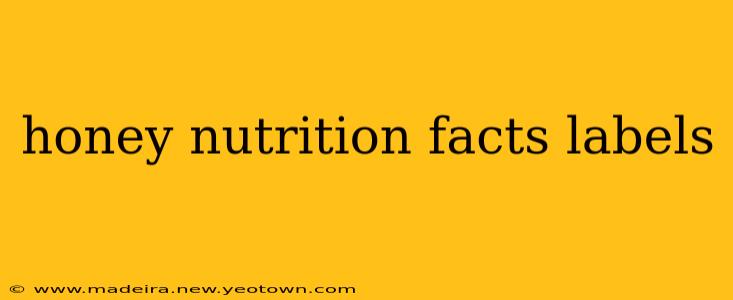Honey, that golden nectar of the bees, has been a culinary staple and a natural remedy for centuries. But beyond its delicious taste, what secrets lie hidden within those tiny nutrition facts labels? Let's embark on a journey to unravel the nutritional profile of this age-old sweetener and address some common questions buzzing around its composition.
What are the main nutrients found in honey?
Honey's nutritional makeup isn't as simple as it might seem. It's a complex mixture, and its precise composition varies depending on factors like the floral source (what flowers the bees visited), the geographical location, and the processing methods. However, some key nutrients consistently appear. Imagine a bustling beehive—each bee contributing a tiny part to the overall nutritional richness of the honey.
Primarily, honey is a carbohydrate source, offering readily available energy. It's predominantly composed of fructose and glucose, simple sugars that the body absorbs quickly. While it does contain small amounts of vitamins and minerals, it's not considered a significant source of these nutrients compared to other foods. You might find trace amounts of antioxidants, B vitamins, and minerals like potassium, but these are present in relatively small quantities. Think of it as a delicious treat with some added health benefits, rather than a nutritional powerhouse.
Does honey contain any vitamins or minerals?
Yes, as mentioned, honey contains trace amounts of vitamins and minerals. But, and this is crucial, these amounts are minimal and shouldn't be relied upon as your primary source of these essential nutrients. A balanced diet rich in fruits, vegetables, and whole grains remains the best way to ensure you're getting adequate vitamins and minerals. Honey is best viewed as a supplementary addition to a healthy, well-rounded diet, adding a touch of sweetness and a whisper of added nutrients.
How many calories are in a tablespoon of honey?
One tablespoon of honey typically contains around 64 calories. These calories come primarily from the carbohydrates, as mentioned. It's important to remember that while honey offers a quick energy boost, it's also calorie-dense. Moderation is key, as excessive honey consumption can contribute to weight gain. Think of honey as a delicious addition, a mindful treat, rather than a base for your entire dietary strategy.
Is honey a good source of antioxidants?
Honey exhibits antioxidant properties, thanks to the presence of various compounds like phenolic acids and flavonoids. These antioxidants help combat free radicals, which are unstable molecules that can damage cells and contribute to various health problems. However, the antioxidant content varies significantly depending on the type of honey. Darker honeys, which are often made from a greater variety of floral sources, tend to have higher antioxidant levels compared to lighter varieties.
How does honey compare nutritionally to other sweeteners?
Compared to refined sugars like white sugar or corn syrup, honey often boasts a slightly better nutritional profile, thanks to those trace amounts of vitamins, minerals, and antioxidants. However, it's still high in sugar, so moderation remains crucial regardless of the type of sweetener you choose. The key takeaway? While honey offers a touch more nutritional value than refined sugar, it's not a significant difference and shouldn't be viewed as a free pass for excessive sugar consumption.
Conclusion: The Honeyed Truth
Honey is a delicious and versatile natural sweetener with some added nutritional benefits. While it offers trace amounts of vitamins, minerals, and antioxidants, it shouldn't be considered a primary source of these nutrients. Its calorie density also requires mindful consumption. Ultimately, the best approach is moderation and integrating honey into a balanced diet as a flavorful enhancement, rather than a nutritional cornerstone. Understanding the nutrition facts label allows for informed choices, ensuring honey remains a sweet treat, enjoyed responsibly.

